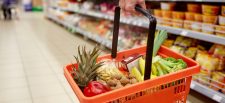Speaking in the Commons, about the current disruption to the supply chain for fruit and vegetables environment secretary, Therese Coffey said: “The situation will last about another two to four weeks.”
Her comments come as Aldi and Tesco join Asda and Morrisons in limiting customer sales on cucumbers, tomatoes and peppers.
Coffey was responding to an urgent question in the House of Commons adding that: “It is important that we try and make sure that we get alternative sourcing options.”
Her Labour counterpart, Jim McMahon said: “There is genuine public concern about the availability of food and as the secretary responsible for our food security – and let’s bear in mind food security is national security – this is absolutely mission critical.”
Ms Coffey said: “I wish to reiterate UK food security does remain resilient and we continue to expect industry to be able to mitigate supply problems through alternative options.”
Resilience in domestic production
In the same week the NFU has launched its vision for boosting farm business resilience and climate-friendly farming across all British farming sectors.
The sector-specific plans, launched at the NFU’s annual conference this week, outline how farm businesses can unlock the benefits of increased efficiency and lower costs while improving the sustainable production of food, energy and fibre.
The plans map out the different priority areas for each sector, including increasing business resilience, and identifies what government policies are needed to overcome key challenges, such as incentivising recognised carbon and nutrient benchmarking and accounting, to support climate-friendly farming.
NFU deputy president Tom Bradshaw said: “In the current economic climate, the production of affordable, climate-friendly food, energy and fibre is more important than ever. Yet British farmers face huge challenges, from extreme weather events to crippling energy, feed and fertiliser costs, which are limiting our ability to deliver these crucial products for the nation.
“To overcome these barriers, we need to build resilience into our agri-food supply chains by improving efficiency, increasing on-farm carbon storage and producing more renewable energy. This will enable a more sustainable future for farm businesses, both financially and environmentally, and a more secure supply of British food, fuel and fibre for the country.
“Smart and efficient farming – climate-friendly farming – is at the heart of building business resilience with the potential to help farmers and growers reduce costs, increase market access and build the sustainability credentials of British food, all while reducing greenhouse gas emissions.
“And if we want British food to continue to be the product of choice for people at home and abroad, it is essential that we have the data and evidence to show we really are producing climate-friendly food.”









